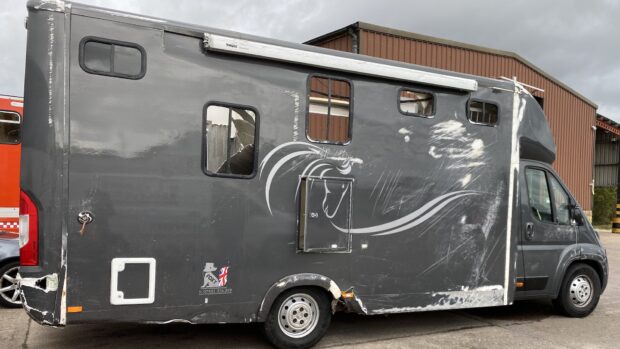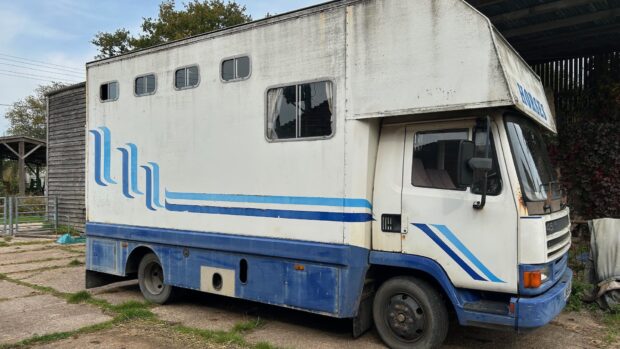Further concerns have been raised about the impact of the Government’s low-emission zones on the equestrian industry.
Expansion plans for London’s ultra low-emission zone (ULEZ) have been given the green light, so from 29 August the zone will expand across all London boroughs, with the aim to “help clear London’s air and improve health”.
Under the ULEZ scheme, some vehicles that do not meet the emission standards could face a daily charge of £12.50. Horseboxes over 3.5 tonnes do not need to pay this ULEZ charge, but do still need to pay the London-wide low-emission zone (LEZ) charge of up to £300 per day, based on vehicle size, if they do not meet the LEZ emissions standards. These LEZ charges and standards have not changed since H&H last reported on them (news, October 2020). Horseboxes up to and including 3.5 tonnes that do not meet the ULEZ standards, are subject to the daily charge.
Other cities with low-emission and clean-air zones include Bath, Bristol, Birmingham, Portsmouth, Sheffield, Edinburgh and Glasgow, and plans for Greater Manchester remain under review.
Although bigger horseboxes do not have to pay the London ULEZ charge, the expansion of the zone is still having an impact on the equestrian industry.
“While the ULEZ may not directly impact [all] motorised horseboxes, some equestrians will still have to travel in the LEZ, for competition, to reach off-road routes, or even if they need to travel with their horse to a vet,” a British Horse Society (BHS) spokesman told H&H, adding that those towing trailers could also feel the impact [if the towing vehicle is not LEZ or ULEZ compliant].
“This expansion has the potential to affect participation and equestrian businesses within the zone that are running events; not to mention how it could lead to a drop in clients for those offering livery in the area.”
The spokesman added that the society “recognises the great need” to improve air quality within Greater London, and “critically, to make sure more people can reap the benefits of being outdoors”.
“It is important to recognise that these plans could have a detrimental impact on equestrians and equine facilities. This is particularly worrying, with the BHS already reporting a loss of 250 riding schools since 2018,” he said.
“If this expansion plan is implemented, it is imperative that riding on the road is made safer for all equestrians and that more off-road access opportunities are provided within the area. Taking these steps will mean that at least some equestrians can access hacking, or riding centres and competitions under saddle, if not too far away.”
Charlie McMillan, owner of Frith Manor Equestrian Centre in north London, told H&H in 2020 that the LEZ had affected the yard and others in the area “enormously”, and that it was not just a problem for [all] horseboxes, but that deliveries were often delayed because companies would try to coordinate with their other deliveries to avoid heavy LEZ charges.
Frith Manor falls under the ULEZ expansion, and Ms McMillan told H&H the situation has continued to deteriorate, and although horseboxes are not affected by the ULEZ, many people still have cars that are not compliant.
“I’ve got client after client who can’t drive into this area [without paying the ULEZ charge],” she said. “It’s very damaging for the business, I’m losing liveries. If they can move their horses out on to the other side of the M25, it makes it a lot cheaper for them.
“It’s stopping new people bringing horses into the area as well, as they know that unless their car meets the emission standards, they can’t afford to be going out every day with a car that’s going to cost them £12.50 each visit. There are four yards in the area and before, we would all always have been pretty full, which is really not the case now.”
Rider Jaime Stubberfield, who keeps her horses in Enfield, north London, – which is in LEZ and the ULEZ expansion – told H&H she stopped competing owing to the cost with the zone charges.
“A few of us used to share an old 7.5-tonne horsebox for £40 each, plus our entry fees – but now that I’d need to hire a box, then add on the diesel and entry fees, it becomes about £300 for a day out,” she said.
“To buy a box that isn’t affected by the charges is going to cost me the best part of £20,000, and I don’t have that.”
In a statement, mayor of London Sadiq Khan said “expanding the ULEZ London-wide was a difficult decision”, but that he “remains committed to pushing ahead in order to save lives, protect children’s lungs and tackle the climate emergency”. From 21 August, the Government scrappage scheme has been increased and every London resident with a non-ULEZ-compliant car will be eligible for a £2,000 grant. Small businesses and sole traders are eligible for up to £21,000 in grants to scrap up to three vans, including horseboxes up to and including 3.5 tonnes.
“The expansion of the scrappage scheme means that the remaining minority of Londoners, who need to drive and don’t have a car that meets the standards, now have access to financial support to make the green transition,” said a Transport for London spokesman.
Drivers can check whether a vehicle meets the ULEZ or LEZ emission standards and is subject to charges at: https://tfl.gov.uk/modes/driving/check-your-vehicle/
You might also be interested in:

Fears clean air plans will hit equestrians hard financially

Good news for horse owners as ‘unworkable’ clean-air zone scrapped

Subscribe to Horse & Hound magazine today – and enjoy unlimited website access all year round
Horse & Hound magazine, out every Thursday, is packed with all the latest news and reports, as well as interviews, specials, nostalgia, vet and training advice. Find how you can enjoy the magazine delivered to your door every week, plus options to upgrade your subscription to access our online service that brings you breaking news and reports as well as other benefits.




